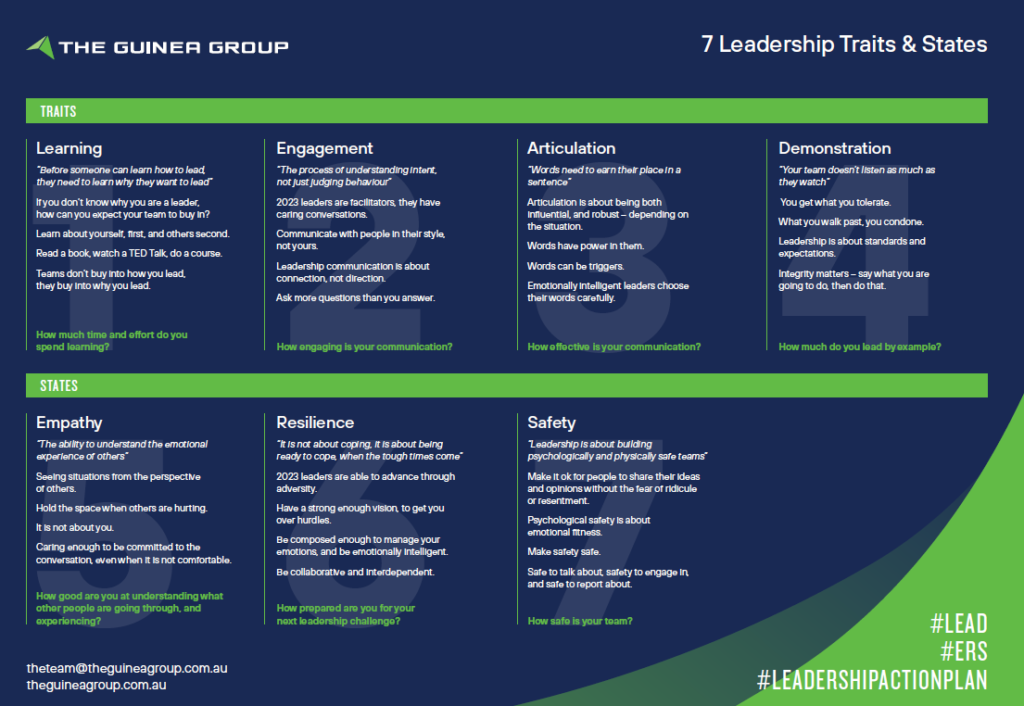Anton Guinea
Entrepreneur, Speaker, bestselling author, and founder of The Guinea Group of Companies. For over 15 years, Anton has helped leaders move their teams to become psychologically safe, physically safe and overall better versions of themselves.

What does the word LEADERS really mean

In a recent post, I unpacked the concept of leadership mandates, and what they are (values alignment, transformational leadership, and created conscious control). These are critical elements of leadership, and they aren’t skills as much as they are a way of being. A way of leading.
This post will unpack specific leadership skills. Skills that are either traits or states. Traits are characteristic patterns of thinking, feeling, and behaving that are adopted by leaders in general terms, in most situations. They differ between individuals and remain rather stable across time. States are characteristic patterns of thinking, feeling, and behaving in a specific situation at a particular moment in time. In shorts, traits are longer-term, and consistent. States (like moods) are more shorter-term and can vary.
This post will unpack a tool that we use with leaders, to help them understand their 7 traits and states, and to do both an inventory check, as well as to develop an action plan, based on the areas the leader wishes to work on. The 7 traits and states include:
1. Learning
Leaders are learners. The best leaders are constantly updating their knowledge base. They are learning about themselves, and others. And they are learning about leadership. They are watching TED Talks, they are reading books, they are listening to Podcasts or audiobooks, or they are studying a degree or similar. Learning (growth) is a key human requirement. A human need. It is hard to continue to develop your leadership if you aren’t learning new skills and knowledge on a regular basis. There is so much great information out there in relation to what works for leaders who want to develop their skills. It is just a matter of finding that information.
2. Engaging
Engagement is a key leadership skill. Engaging others in conversation. Being engaging, and being interested, not interesting. Starting conversations; having caring conversations, robust conversations, career conversations. Communicating with others, in their style (DISC), not your own. Engaging leaders are open leaders, who can hold the space when others need them to. They are emotionally intelligent, and they can think fast and talk slow. They can understand how other people are feeling and what they are experiencing. The engagement element of leadership is about caring and connection.
3. Articulating
Leaders need to be able to give clear direction. That is why being able to articulate clearly is a key leadership skill. Being able to articulate things like why you are a leader, what your leadership values are, and how they drive your behaviour. To articulate what the vision, mission and values of the team are, and what the leader’s expectations are. What the consequences of not meeting expectations will be, and why.
4. Demonstration
Demonstration is about leading by example. And leading with integrity. Leading by example is not the most important thing about leadership, it is in the only thing. Your team don’t listen to you as much as they watch you, so remember that your behaviour is always on show. And be cognisant of what it is saying about you. Because others follow your lead. Team members are a reflection of their leader, so if you ever wonder why your team is behaving in a certain way, always reflect on what you did or didn’t do to encourage that behaviour. Either consciously or subconsciously.
5. Empathy
Empathy sits somewhere between apathy and sympathy. And it’s neither of these emotional states. Apathy is not caring, and sympathy is over-caring. Empathy is understanding, it is not about caring. Empathising is about walking in another person’s shoes and understanding from a cognitive perspective what that situation must be like for the other person. It is about understanding what emotions the other person must be feeling and it is about being compassionate (which is about taking action of some sort to support the other person, if they need it).
6. Resilience
There are six elements of resilience (the PR6, as developed by Jurie Rossouw) include vision, collaboration, composure, health, tenacity and reasoning. Resilience is not about being able to cope with a tough situation. It’s about advancing despite adversity. And you don’t build resilience during a tough situation, you develop it before the situation. Or following it. Learning resilience before you need it is about personal development. Learning it following a tough situation can be part of post-traumatic growth (PTG). That way, when the same situation happens again, you will be ready and better prepared to deal with it.
7. Safety
Your team members need to feel safe. Team members who feel safe will share their ideas, opinions and views and don’t have to worry about ridicule, rejection or resentment. Safety is not just about physical safety. It is about both feeling safe and working safely. Safety is a value. Safety, and whether to put something else (like production, schedule, or cost) above safety could lead to dire consequences.
Please email me to work through a self-diagnosis of your 7 traits and states. Email: theteam@theguineagroup.com.au.
Here is a copy of the 7 traits and states in a summarised version, if you would like to download it. The self-diagnostic is on the back side, which is not included with this download.

And please click here to subscribe to our email newsletter!
And of course, please click the image below if you’d like to chat about what leadership means to you.
If you would like to learn more about Anton or The Guinea Group, please click here to book into Anton’s calendar, to:
UPGRADE your Mindset
UPSKILL your Leadership
UPLIFT your Teams
About Anton
Anton has dedicated his working life to helping leaders to upgrade their mindset, upskill their leadership, and uplift their teams! With a focus on helps leaders to better lead under pressure. Anton is an entrepreneur, speaker, consultant, bestselling author and founder of The Guinea Group. Over the past 19 years, Anton has worked with over 175+ global organisations, he has inspired workplace leadership, safety, and cultural change. He’s achieved this by combining his corporate expertise, education (Bachelor of HR and Psychology), and infectious energy levels.
Work With Anton!
Subscribe to our Newsletter
